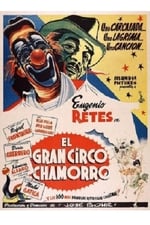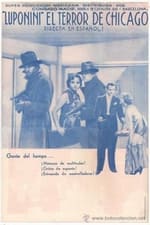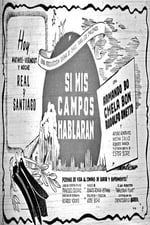Zur Person
Bekannt für Regie
Auftritte 32
Geschlecht Männlich
Geboren am 3. September 1901
Verstorben am 29. Mai 1994 (92 Jahre alt)
Geboren in Bonn, Germany
Auch bekannt als
- Yopes Böhr Elzer
- Хосе Бор
Datenstand
100
Genial! Das sieht gut aus!
Anmelden um einen Fehler zu melden
Biografie
Born in Germany on November 3, 1901 under the name of Joseph Bohr Elzer, the young José Bohr arrived with his family to colonize southern Chile in 1904. It was in the city of Punta Arenas where he began his precocious cinematographic and musical career, composing songs including the hymn "Punta Arenas", playing the piano for silent films and making his first film works before he was in his twenties.
After emigrating to Santiago in 1921, he went to Brazil, Uruguay and Argentina, hired by the Chilean Ministry of Foreign Affairs to make a documentary. Later he settled in Buenos Aires, where he composed a good part of the 200 songs that swelled the popular songbook of the time, such as "Y tenía un lunar", "Cascabelito" and "Pero hay una melena", as well as advertising tangos for music houses. He performed for the first time in the United States in 1925, starring in the musical show Gaucho at the Paramount Theater in Broadway. In this country he rubbed shoulders with the stars of the big screen, enjoying bohemian life and success. Shortly thereafter, he starred in the first Spanish-language film produced in Hollywood, Sombras de gloria, for which he received a symbolic Oscar, since the category of best foreign film did not yet exist.
In Mexico, where he moved in 1932 and became friends with renowned artists such as Luis Buñuel, Cantinflas and Jorge Negrete, he became one of the pioneers of cinema, shooting more than thirty films. It was there when, in 1936, Claudio Arrau starred in and interpreted the music for his film, which was about the life of Liszt.
Upon his return to Chile in 1940, he served as general director of Chile Films and shot 16 films. He composed the music for all of them, as was usual in the sixty films he made during his lifetime. Some of his most famous films are Uno que ha sido marino, Si mis campos hablaran and El gran circo Chamorro.
In addition to being named Illustrious Son of the city of Punta Arenas in 1976, the Government decorated him with the Bernardo O'Higgins Order of Merit.
In the 1980s he settled in Denmark with his sons Daniel and Eduardo, also dedicated to film and music.
He died on May 29, 1994 in Oslo, Norway.
Born in Germany on November 3, 1901 under the name of Joseph Bohr Elzer, the young José Bohr arrived with his family to colonize southern Chile in 1904. It was in the city of Punta Arenas where he began his precocious cinematographic and musical career, composing songs including the hymn "Punta Arenas", playing the piano for silent films and making his first film works before he was in his twenties.
After emigrating to Santiago in 1921, he went to Brazil, Uruguay and Argentina, hired by the Chilean Ministry of Foreign Affairs to make a documentary. Later he settled in Buenos Aires, where he composed a good part of the 200 songs that swelled the popular songbook of the time, such as "Y tenía un lunar", "Cascabelito" and "Pero hay una melena", as well as advertising tangos for music houses. He performed for the first time in the United States in 1925, starring in the musical show Gaucho at the Paramount Theater in Broadway. In this country he rubbed shoulders with the stars of the big screen, enjoying bohemian life and success. Shortly thereafter, he starred in the first Spanish-language film produced in Hollywood, Sombras de gloria, for which he received a symbolic Oscar, since the category of best foreign film did not yet exist.
In Mexico, where he moved in 1932 and became friends with renowned artists such as Luis Buñuel, Cantinflas and Jorge Negrete, he became one of the pioneers of cinema, shooting more than thirty films. It was there when, in 1936, Claudio Arrau starred in and interpreted the music for his film, which was about the life of Liszt.
Upon his return to Chile in 1940, he served as general director of Chile Films and shot 16 films. He composed the music for all of them, as was usual in the sixty films he made during his lifetime. Some of his most famous films are Uno que ha sido marino, Si mis campos hablaran and El gran circo Chamorro.
In addition to being named Illustrious Son of the city of Punta Arenas in 1976, the Government decorated him with the Bernardo O'Higgins Order of Merit.
In the 1980s he settled in Denmark with his sons Daniel and Eduardo, also dedicated to film and music.
He died on May 29, 1994 in Oslo, Norway.
Regie
Darsteller
|
|||||||||
|
|||||||||
|
|||||||||
|
|||||||||
|
|||||||||
|
|||||||||
|
Ton
|
|||
|
|||
|
|||
|
|||
|
|||
|
|||
|
Produktion
|
||||||
|
||||||
|
||||||
|
||||||
|
Drehbuch
|
|||
|
|||
|
|||
|
Schnitt
|
|||
|
|||
|








